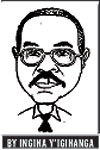Continuing from last week, the bus finally offloaded us in Mbarara bus-park.On ‘landing’, we all took time to marvel at the ‘huge’ town and at how a house could carry another one on its ‘head’! This was nothing as a town, explained our Munyankore guide, because Kampala was ten times bigger. Something bigger? We could hardly imagine.


Continuing from last week, the bus finally offloaded us in Mbarara bus-park.On ‘landing’, we all took time to marvel at the ‘huge’ town and at how a house could carry another one on its ‘head’! This was nothing as a town, explained our Munyankore guide, because Kampala was ten times bigger. Something bigger? We could hardly imagine.
The guide explained that what we called ‘houses carrying other houses’ were actually known as ‘kalinabili, but again he said that was nothing. Uganda’s capital city, he went on, had houses that could carry even five houses.
Of course, today I know such to be houses that have multiple storeys but, green from the village as we were, we couldn’t have known that.
As the guide was leading us to a shop, someone remarked that the earth here was harder than a metal and we looked down: indeed, it was as smooth as a metal and equally hard. Personally, however, I knew different. I had seen such earth one day when I’d gone to visit my Godfather in Rwaza, northern Rwanda.
I remembered that I’d been awed by such earth in my Godfather’s house. Even if the house was a grass-thatched affair, like all the houses I was used to, it had a smooth floor and similarly hard, raised seats on the side of the walls.
They’d told me it was earth scrubbed hard with sweet-potato leaves and I gave my fellow ‘greens’ that explanation so that they didn’t have to ask the guide.
Today we all know that kind of ‘earth’ to be tarmac, but what the heck!
Anyway, the guide led us to a shop and we did our shopping: my late brother and I, a pair of socks, a toothbrush and a single undergarment each. The others bought various items: shoes, slippers, toothbrushes, combs and suchlike.
Those from Nyakivara who had sold cows could even afford shirts or trousers.
What I remember is that we emerged from the Indian trader’s shop all together different people. We donned our new garments and some even discarded what they were wearing, to the disbelief of the Indian! My brother and I could only put on shoes now that we had socks, but imagine the boys who put on their new shirts, trousers and shoes and left their tattered shirts and shorts littering the shop-floor.
After that, the guide pointed a finger at our-soon-to-be school and wished us luck. We’d certainly need it, because we’d all heard stories of the horrors of teasing.
And it was no joking matter because we’d been told of some new students who’d been killed in some schools, like Butobere Secondary School or Kigezi High School, southern Uganda.
So, it was with hearts banging against our chests that we arrived at Ntare School to wait for our uniforms.
Luckily, Ntare was a gentleman’s school as we learnt on arrival. Thanks to the solidarity of Rwandan refugees, also, we were briefed on what to say in the evening, when the little teasing that took place there would come.
Having been prepared, even sometimes assisted, in how to tell outlandish stories, which is what the teasing consisted of, we sent the students into guffaws of laughter in our different dormitories, in the evening.
That is how we gained our confidence and embarked on the business that had brought us: studying. The school had good teachers and books were legion and there would be no excuse for failure. Moreover, we dreaded failing because it would mean a return to the refugee camp.
We also coveted being called an ‘Umusiniya’ because that almost meant being a superior creature. In the refugee camps, ‘Abasiniya’ (plural for ‘Umusiniya’) were literally worshiped.
In Uganda, there were senior secondary schools, from whence ‘Umusiniya’ and ‘Abasiniya’ are derived, even if I don’t remember hearing of junior secondary schools. The root word ‘siniya’ is therefore a Kinyarwanda corruption, but those corrupted English words existed in other languages, too.
And the secondary school students were respected by the different tribes of Uganda too, as they were respected everywhere else in Africa, I guess.
For that, we attached a lot of value to our uniforms when we received them. You could never be seen abusing your uniform, by wearing it in bars, for instance. Which is why I am vastly irked when I see uniformed students in bars, here in Rwanda.
Drinking is wrong for students, in the first place. Yet there is a school that seems not to mind when its students are let loose into bars.
‘College des Bons Amis’ students, in Kinyinya, near the Deutshe Velle outpost in Rwanda, need to be contained, by all the means possible. The last time I saw them throwing a ruckus I thought they seemed set to go on till late in the night.
I think every parent should take it as their duty to report such cases to police, even if it may not be their constitutional right.
Abasiniya of today should give respect to their uniforms the way Abasinya of bygone days did.


